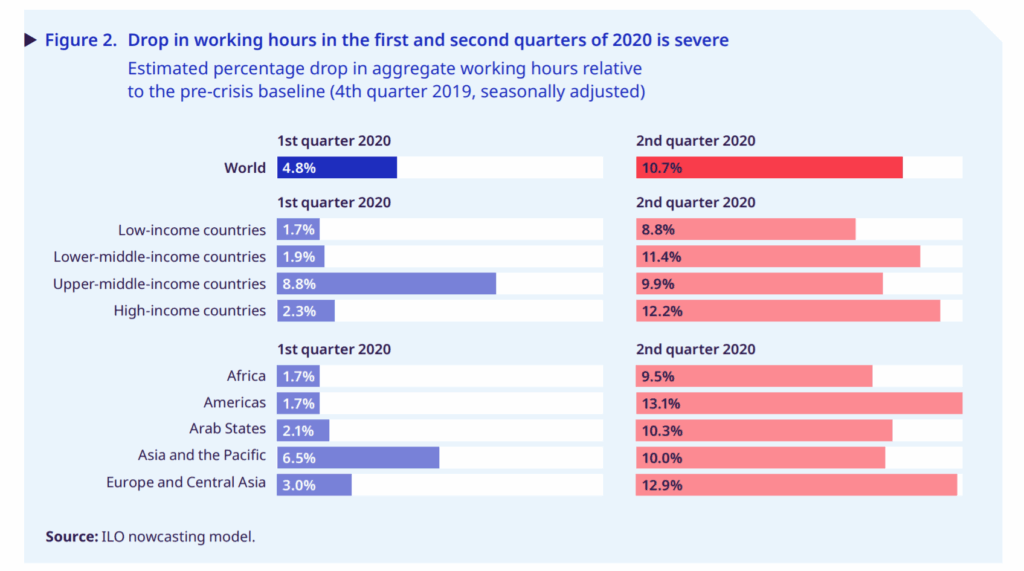Subscribe
Receive the latest strategic talent insights straight from the CEO’s desk
Review of Global Labor Force Trends
We began with a detailed review of Global Labor force trends. ILO has done some predictions that are a bit concerning, especially for youth employment. ILO has stated that the most recent figures show that young people are disproportionately affected by the COVID‑19 crisis, with multiple shocks including disruption to education and training, employment and income losses, and greater difficulties in finding a job. (Source ILO Monitor).
The most important impact on this is the disruption to education and training. At each level, we have to ensure learning never stops. In this digital age, there is really no reason why education and learning should stop. While organizations are making significant efforts towards Reskilling, our analysis shows less than 20% of the organizations have made a meaningful impact. Several enterprises have announced a very big reskilling initiative.But the pace of progress is still limited. Leadership emphasizing ongoing learning and commitment to reskilling is also phenomenally important. Consider this fascinating historical study from the Philippines. Post World War II, the United States experienced a significant shortage of nursing talent.
As a result, the US established nursing schools in the Philippines to create talent. As a result, there was an influx of nurses from the Philippines in the US. But the story does not end here. The late 1990s saw a call center boom in the Philippines. As a Nursing degree was viewed as a ticket to the US in the Philippines, the Government was finding it difficult to staff up the growing Call Centers.The Government created a plan to position call center jobs as a means to gain experience working in global companies. Consistent efforts were shown in communication and changed the perception of call center jobs. But the Government did not stop there. They also predicted that Nursing as a profession to migrate would slow down eventually (which it did in 2008), so they broadened and strengthened the nursing program to meet the healthcare needs of the country (expanded the program curriculum, for example). The moral of the story is – Reskilling is a very strategic initiative. Often leaders have to look years ahead (not just 2 or 3 years). If leadership is not seeing this, HR leaders have to help them understand this. (This story is derived from Shifting Employabilities by Yasmin Y. Ortiga – Singapore Management University)
Getting the course content and taking advantage of many low cost and free resources is something I see as a challenge. We are dedicating several ML models and manual labor for this (yes, this process is still manual and painful to certain extent?). Look at the case study from the Universidad De Cantabria in Spain. This is a mid-sized university with about 12,000 students. Mostly a face to face university till about 2008. Then something dramatic happened. In 2008, a few students from Electrical Engineering and implemented a game-based learning for C-Programming language. The game featured a story plot where a submarine must accomplish a rescue mission. This was so effective that the university implemented this type of learning within their curriculum. Today, they have one of the best digital learning infrastructure in Spain. All this is because a few students decided to be super innovative 15 years back. (This story is derived from Simulation-based education involving online and on-campus models in European universities – Neila Campos et, al)
We are noticing there is an uptick of companies adding empathy to job descriptions. Many jobs, such as call center jobs, are focusing on being a lot more empathetic around this pandemic time. Several university studies are there in this regard. Some companies are actively incorporating empathy training for all customer-facing roles (especially post-pandemic). Here is a summary of our research on this.

The pandemic has impacted the working population differently across different countries. The impact seems to be trending higher in High-income countries. But one key thing that the graph does not tell you is this is not because of drop-in Demand. As conditions improve, this will improve. To a certain extent, this is due to the failure to transform prior to this pandemic fully digitally.

Certain industries and companies truly did not take digital transformation as a serious initiative. As HR, we have to work hard to ensure this does not happen again. Digital Transformation is not something we can delegate to technical resources alone. I remember arguing with an HR executive who would not use screen share in 2015!.Many leaders would have to get into the bandwagon of digital transformation rapidly. The learning curve for these technologies is very minimal, and the pandemic has already forced several non-digital folks into digital. But it does not stop here. This is going to be a decade of learning!
Overall, we are quite excited about the role HR can play under the emerging circumstances. If we plan the initiatives correctly, we can accelerate transformation and adaptation and make our enterprises that we genuinely care for, a great place to work.